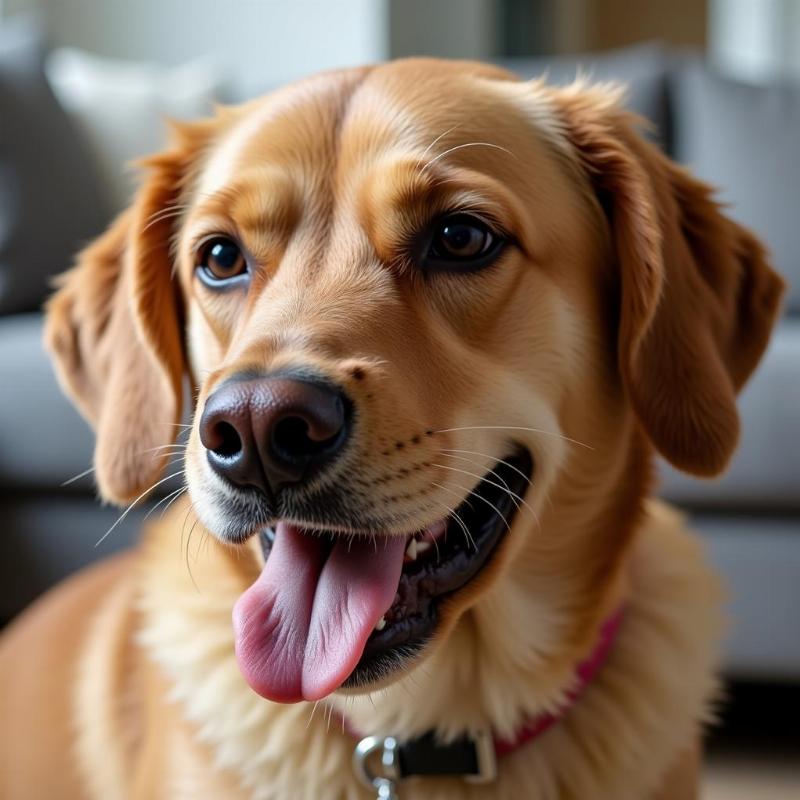Labored breathing in dogs, also known as dyspnea, can be a frightening experience for any pet owner. Recognizing the signs of labored breathing is crucial for seeking timely veterinary care. This article will guide you through identifying what labored breathing looks like in dogs, its potential causes, and when it’s time to rush to the vet.
Identifying Labored Breathing in Your Canine Companion
Labored breathing isn’t always obvious. While excessive panting on a hot day is normal, labored breathing signals something more serious. Look for these key indicators:
- Increased respiratory rate: A dog breathing rapidly at rest, especially when not hot or exercising, is a red flag.
- Exaggerated chest movements: The dog’s chest and abdomen might expand and contract dramatically with each breath. They may even seem to be struggling to take in air.
- Noisy breathing: Wheezing, gasping, gurgling, or whistling sounds accompanying breaths can indicate an obstruction or fluid buildup.
- Blue-tinged gums: Cyanosis, a bluish discoloration of the gums, tongue, and lips, is a serious sign of oxygen deprivation and requires immediate veterinary attention.
- Unusual posture: Dogs experiencing labored breathing often adopt an unusual posture, like extending their neck and head forward with elbows out, to try and open their airways.
- Distress and anxiety: Restlessness, pacing, whining, and an inability to settle down can accompany breathing difficulties.
Common Causes of Labored Breathing in Dogs
A variety of issues can cause labored breathing in dogs, ranging from relatively minor ailments to life-threatening conditions:
- Heatstroke: Overexertion in hot weather can lead to heatstroke, which causes rapid, shallow breathing.
- Heart disease: Congestive heart failure can cause fluid to build up in the lungs, leading to difficulty breathing.
- Asthma or allergies: Inflammation in the airways can restrict airflow, causing wheezing and labored breathing.
- Pneumonia: Infection in the lungs can cause fluid buildup and inflammation, making it difficult to breathe.
- Kennel cough: This highly contagious respiratory infection can cause a harsh, hacking cough and sometimes labored breathing.
- Foreign body obstruction: If a dog inhales a foreign object, it can partially or completely block the airways.
 Dog with Asthma
Dog with Asthma
“It’s important to remember that panting doesn’t always indicate labored breathing,” says Dr. Emily Carter, DVM, a leading veterinary specialist in respiratory diseases. “However, if your dog’s panting is excessive, accompanied by other symptoms, or persists for an extended period, it’s vital to seek veterinary attention.”
When to Seek Emergency Veterinary Care
Labored breathing is always a serious concern and requires veterinary attention. If your dog exhibits any of the following signs, seek immediate emergency care:
- Blue or gray gums/tongue
- Extreme difficulty breathing
- Collapse or loss of consciousness
- Severe coughing or choking
- Sudden onset of labored breathing
What to Expect at the Vet
The veterinarian will conduct a thorough physical examination, including listening to your dog’s heart and lungs. They may also recommend diagnostic tests such as:
- Blood tests: To assess overall health and identify potential underlying conditions.
- X-rays: To visualize the lungs and heart, checking for fluid buildup, masses, or foreign objects.
- Ultrasound: To provide a more detailed view of the heart and surrounding structures.
Preventing Labored Breathing in Dogs
While not all causes of labored breathing are preventable, you can take steps to minimize the risk:
- Maintain a healthy weight: Obesity can exacerbate breathing problems.
- Avoid strenuous exercise in hot weather: Provide plenty of fresh water and shade.
- Keep vaccinations up to date: Protect your dog from respiratory infections.
- Avoid exposure to allergens and irritants: Keep your home clean and free of dust, smoke, and strong chemicals.
“Regular veterinary check-ups are crucial for early detection of potential health issues, including those that can lead to labored breathing,” advises Dr. Carter. “Early intervention can significantly improve outcomes and enhance your dog’s quality of life.”
Conclusion
Understanding what labored breathing looks like in dogs is crucial for responsible pet ownership. By being aware of the signs, potential causes, and when to seek emergency care, you can help ensure your furry friend receives the timely and appropriate treatment they need. Don’t hesitate to contact your veterinarian if you have any concerns about your dog’s breathing.
FAQ
- What is the difference between panting and labored breathing? Panting is a normal way for dogs to regulate their body temperature, while labored breathing involves increased effort and often includes other symptoms like noisy breathing and unusual posture.
- Can anxiety cause labored breathing in dogs? Yes, stress and anxiety can lead to rapid, shallow breathing.
- What should I do if my dog is having a severe asthma attack? Seek immediate veterinary care.
- Is labored breathing in dogs always an emergency? While not always an immediate emergency, labored breathing always warrants veterinary attention.
- Can certain breeds be more prone to labored breathing? Yes, brachycephalic breeds (those with short noses) are more susceptible to respiratory issues.
- How can I make my dog more comfortable if they are experiencing labored breathing? Keep them calm, provide fresh water, and ensure they are in a well-ventilated area.
- Are there any home remedies for labored breathing in dogs? Never attempt to treat labored breathing at home without consulting a veterinarian.
Beautdogs.us is your leading resource for comprehensive dog care information, breed insights, and product recommendations. Whether you’re a new dog owner or a seasoned expert, Beautdogs.us provides authoritative and engaging content to help you navigate the joys and challenges of dog ownership. From understanding canine health to finding the perfect products for your furry friend, we’re here to support you every step of the way. Contact us today for more information! Email: [email protected], Phone: +1 501-555-7529. Visit us at Beautdogs.us.